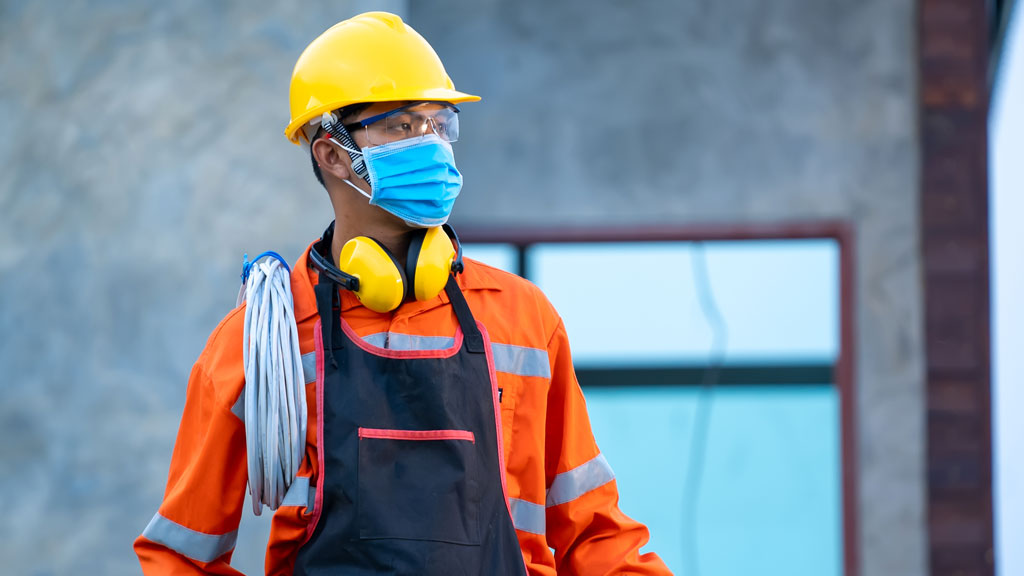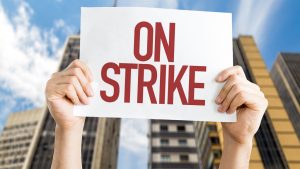Ontario construction health and safety stakeholders admit there remains one frustrating gap when it comes to protecting workers from COVID-19 — refusals by some workers to wear masks and physically distance themselves on site.
Despite improving COVID-19 prevention protocols, frequent consultation involving all players and the addition of new tools such as contract tracing apps and rapid testing, these particular gaps in their system’s last line of defence are disappointing.
While some stakeholders point to relatively low rates of infection and argue, typically, “I don’t know what else we can do,” others suggest there is room for improvement, with more fines for non-compliant workers and supervisors and the addition of COVID-specific protocol officers to crews among the recommendations.
Stakeholders including Minister of Labour, Training and Skills Development (MOL) Monte McNaughton, Chief Prevention Officer Ron Kelusky, Carpenters’ District Council of Ontario president Mike Yorke and Ontario General Contractors Association president Giovanni Cautillo were asked to respond to charges of non-compliance with basic safety protocols on large Toronto jobsites contained in a recent Toronto Star article.
The story quoted several construction workers who talked about lack of mask-wearing when inspectors are not around, poor enforcement of mask-wearing protocols from site supervisors and lack of hygiene on sites with inadequate hot water for proper handwashing.
Stakeholders were also asked whether second-wave infection statistics from December and January in Ontario reflected a failure in overall COVID protection protocols. In those months there were reports of 69 positive test results at The Well project, 15 cases at the Michael Garron Hospital jobsite and 28 positives among Crosslinx employees and subcontracted workers — all Toronto sites.
Construction track record
“I can speak to the track record of construction,” said McNaughton. “Overall, it’s been one of the safest industries in the province, because industry, labour, workers and government have all worked together. When some were calling to close down construction, we took a different approach. We reached out to labour and developed health and safety guidelines and protocols.”
McNaughton noted the ministry hired 100 new inspectors and has now done over 14,000 inspections in construction since COVID-19 hit the province.
“We shut down 67 unsafe workplaces and jobsites,” he said. “Many of those were in construction.
“Overall, it’s been a model of a success.”
The figures most often cited for infections in the sector come from the Workplace Safety and Insurance Board. Kelusky said the latest figures show that of 15,800 WSIB claims approved for COVID-19 from all workplaces since the pandemic started, under 130 were from construction.
As McNaughton pointed out, that is out of the overall total of half a million construction workers in the province.
Still, stakeholders acknowledged problems obtaining conformity with mask-wearing.
Yorke said he consulted with staff reps who are active on sites and while the feedback was that “sites have never been better” and more hygienic, there is always the potential for some workers to avoid wearing masks on smaller sites, where there are no health and safety officers on site all day. He suggested employment of COVID-19 compliance officers on more sites would boost overall compliance.
McNaughton charged, “There are always bad actors in every type of industry. And those are the ones that we’re cracking down on.”
He referred to statistics indicating that from March 11, 2020 to Feb.19, 2021, the MOL has issued 25,409 orders or requirements during COVID-19-related field visits in the construction sector.
Carmine Tiano, director for occupational health services with the Provincial Building and Construction Trades Council of Ontario, commented, “Yes there are workers that are playing the game that they don’t want to wear masks, but guess what, our act (the Occupational Health and Safety Act) allows the ministry to go in, fine the super, fine the workers.
“Is it perfect? No. But we’re doing everything we can,” he added.
‘Not Neanderthals’
Ian Cunningham, president of the Council of Ontario Construction Associations, acknowledged there are some incidents of non-compliance but “we are not hearing about widespread non-compliance across the industry.”
He also took offence with the suggestion that construction workers do not respect public health.
“Today’s construction workers are better educated, better trained and better informed than ever before. They understand the seriousness of the pandemic and the need for protective measures to keep themselves, their coworkers and their loved ones safe. They are not the macho Luddite Neanderthals the article in the Star might lead you to believe they are,” said Cunningham.
Enzo Garritano, president and CEO of the Infrastructure Health and Safety Association, said of the thousands of workers coming though the association’s training facilities over the last nine months, there has been largely co-operation and compliance with masking and sanitizing protocols.
“Unfortunately, not all share the same values and beliefs when it comes to the risk of the virus and its implications,” said Garritano. “Both employers and fellow workers need to stay on top of this to raise compliance with mask use and hopefully shift attitudes, which does take time.”
Cautillo said anti-masking is not a “rampant” issue in the industry but it does exist.
“At what point in time do we start looking at the responsibilities of the individual worker?” he said. “Do we have enough MOL inspectors to be on every single site, every single second of the day?”
Kelusky said reaching out to workers is part of a continuous learning process. He said the majority of concerns have been in the residential sector, not ICI. Kelusky differentiated between proactive visits by MOL inspectors and reactive.
Reactive visits come from complaints, generally from workers on jobsites. There have been over 11,000 proactive visits this year to date and 3,600 reactive visits — meaning, he suggested, there were lots of workers who were unsatisfied with health and safety conditions at their jobsites and reached out to the MOL.
“I’m sure there’s people, a very small percentage of people, that are just genuinely contrary, but I think the vast majority of people are trying their best,” he said.
The MOL’s Stay Safe All Day program instituted Feb. 2 has inspectors targeting the most frequent instances of non-compliance, Kelusky said — during lunches, on breaks and carpooling to work. Inspectors who have been working with employers and workers on worksite logistics ever since the first protocols were introduced last spring are now reinforcing best practices in these newly targeted situations, he said.
Kelusky said more inspections will be effective on the micro level and will combine with new jobsite safeguards such as the TraceSCAN contact tracing app being spearheaded by LIUNA and the rapid antigen testing now unfolding at numerous large sites in Toronto, supported by EllisDon, to reduce infections.
“You know, we will get a handle on this. It’s a challenge of habits that are off the job as well as on the job that we have to be constantly communicating to people,” said Kelusky.
Follow the author on Twitter @DonWall_DCN.











I’ve been working in construction for 10 years and it never had hot water or even been clean always been disgusting washrooms, and cold water, superiors act abusive ways. Working with mask specially carrying weights is very hard and unhealthy way we need solutions and more good inspector around someone to really protect the construction workers plus protect their salaries that is been concentrated on big companies